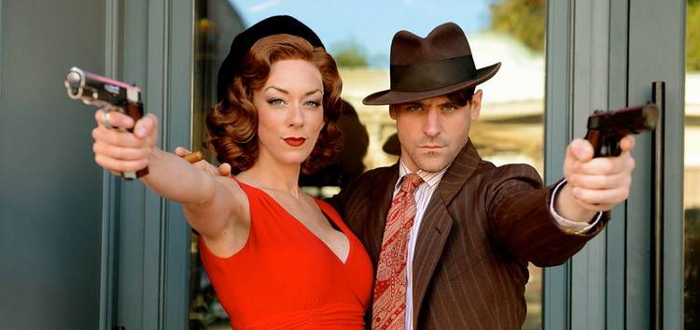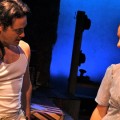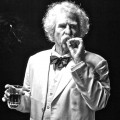As tales of anti-heroes go, the story of Bonnie Parker and Clyde Barrow is as American as apple pie. Eighty years after their deaths, the trigger-happy couple have become legends, but a new show about the pair aims to keep it real. San Jose Stage Company is presenting the regional premiere of the musical, Bonnie & Clyde.
In dramatizing their story, the challenge is in highlighting the poignancy without romanticizing the deviancy. Setting such a tale to music can prove trickier still.
And who knew these infamous criminals were also into music? Not enough to soothe their savage impulses, but even so: Bonnie and Clyde were passionate musicians and music patrons. Bonnie was a pageant singer, Clyde a saxophonist and guitar player. His saxophone was found in their famously shot-up ’34 Ford Deluxe sedan.
The musical opens in Depression-era West Texas, transitioning between the duo’s respective childhoods: Bonnie (Allison F. Rich) is a waitress with bigger ambitions, while Clyde (Cliff McCormick) is a mischief-maker with destructive desires. Using projections on a large video screen at the back of the stage, the narrative moves seamlessly through their early lives, simplifying their personal struggles without cheapening the experience—until their fateful meeting.
From there, the famous relationship and its fiery demise plays out through a stunning array of rockabilly, blues, soul, gospel, ragtime and country music. As Bonnie, Rich is both boisterous and charmingly reluctant, playing the devilish muse to the defiant Clyde (McCormick). The pair not only have tremendous voices, but they also have great chemistry.
Although a lot of the scenes overlap due to the condensation of a complicated story, they still work. Many of the numbers require meticulous choreography, not an easy feat on a small stage, but they go off without a hitch. Perhaps the only drawback is the use of microphones: The performers’ voices are so strong that miking seemed unnecessary and caused some distortion during one number.
Bonnie & Clyde doesn’t flinch from the brutal reality that Bonnie, and especially Clyde, were stone-cold killers. Violence is very much present in show. Even the show’s program, with its extensive historical information, makes it clear that the real Bonnie and Clyde were accidentally notorious, caught up as a symbol of an attitude that had begun to fester in the general frustration and despair of the Great Depression.
In this way, the musical seems less about Bonnie and Clyde than an exploration of a dark time in American life, using the era’s anti-heroes to express this frustration through a wonderful and rich variety of American music.

 Los Gatos Brewing Company Hosts 'Firkin Fest' This Weekend
Los Gatos Brewing Company Hosts 'Firkin Fest' This Weekend  Scott’s Seafood to Host Firestone Walker Brewmaster’s Dinner
Scott’s Seafood to Host Firestone Walker Brewmaster’s Dinner 









